Welcome to “Tips From Sticks-In-The-Mud Woodshop.” I am a hobbyist, not a professional, someone who loves woodworking, just like you do. I have found some better ways to accomplish tasks in the workshop and look forward to sharing those with you each month, as well as hearing your problem-solving ideas.
Tip #1
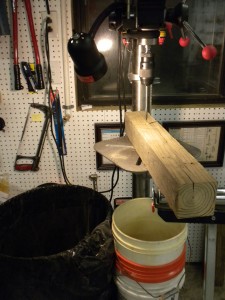
The closer your bucket is to the hole in your drill press table the greater the percentage of refuse you’ll catch. Just stack them up to get the height you need.
Some jobs are big enough to set up dust collection on the drill press. Others just don’t take long enough or make a big enough mess to justify the time for all that setup. Still, if you want to catch the mess and minimize the time for cleanup, a 5-gallon bucket or small trash can under the center of the drill press will catch the bulk of your chips and the bigmouthed garbage can next to the drill press will give you a quick and easy place to sweep flying chips from the drill press’ stage. When I do want to use dust collection on the drill press, this is the way I usually do it.
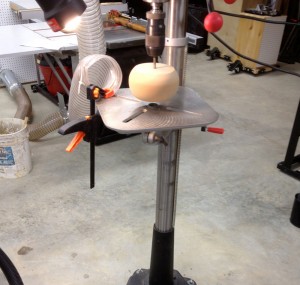
As the drill press slings shavings or sanding dust, the open hose of the dust collector sucks them up. Cleanup after a job like this is minimal.
I have a couple of “extra” drops to our dust collector, 4″ each, and they can be used for whatever portable machine they’re needed for.
When I was designing this system, with the help of Oneida, I didn’t have a specific plan for these two connections, but figured if I never used them I could always keep the blast gates closed and there wouldn’t be much cost, especially compared to cutting into the line and trying to insert a connection later. They have proven to be invaluable and they can be used for whatever portable machine they’re needed for. Roll the router table up, pull down the flexible hose and hook ‘er up.
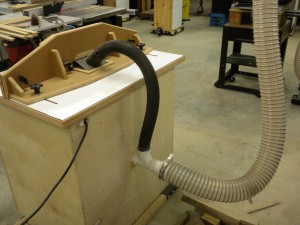
Hooking up the router table is quick and easy with one connection taking care of off-the-bit and under the router as seen below.
Ditto for the oscillating spindle sander below, which can accept a Shop Vac, the Festool Dust Extractor or, with this adaptor, the full force of the dust collector. These two unassigned drops have really come in handy.
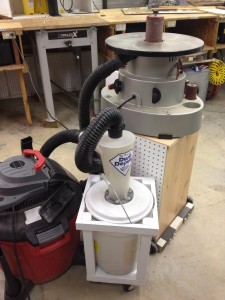
The oscillating spindle sander can accept a Shop Vac, with or without the Dust Deputy separator, which really helps reduce filter clogging.
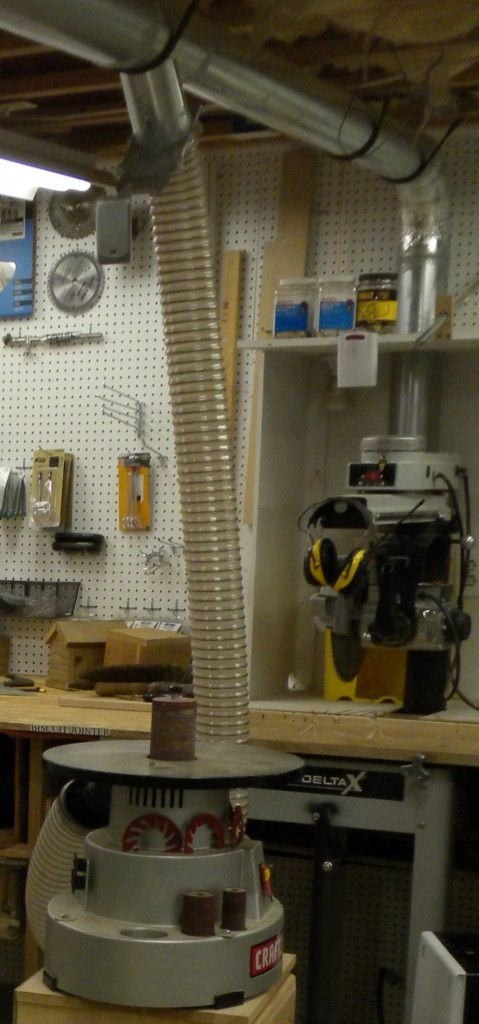
With this adaptor, the full force of the dust collector can be applied to the sanding dust output of the oscillating spindle sander.
Tip #2
No Southern-fried Southern boy wants to be called a Yankee, but we share the characteristics of shrewdness and thrift. Thus, each month we include a money-saving tip. It’s OK if you call me “cheap.”
Never pay for buckets.
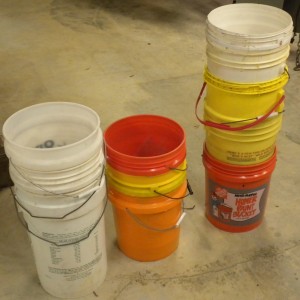
Like garbage cans, buckets are everywhere I go. I know “Homer” has orange ones for sale, and there are blue ones you can buy, but I prefer mine totally free, if you don’t mind.
Instead, keep your eyes open as you drive around. Buckets fall from vehicles all the time and you need only find a safe place to pull over and fetch the free bucket. And, remember what Mama always said, “Look both ways before crossing the street.”
Jim Randolph is a veterinarian in Long Beach, Mississippi. His earlier careers as lawn mower, dairy farmer, automobile mechanic, microwave communications electronics instructor and journeyman carpenter all influence his approach to woodworking. His favorite projects are furniture built for his wife, Brenda, and for their children and grandchildren. His and Brenda’s home, nicknamed Sticks-In-The-Mud, is built on pilings (sticks) near the wetlands (mud) on a bayou off Jourdan River. His shop is in the lower level of their home. Questions and comments on woodworking may be written below in the comments section. Questions about pet care should be directed to his blog on pet care, www.MyPetsDoctor.com. We regret that, because of high volume, not all inquiries can be answered personally.


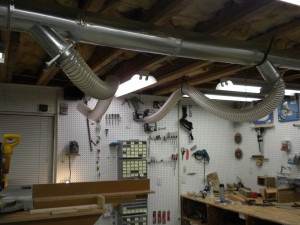
very nice work thanks
Hi Jim,
Thanks for the tips. I was, however, somewhat disturbed to see your drill press fitted with wheels. These drill presses are quite top heavy and easy to tip over. Add wheels and when you roll them you’d better be sure the floor is clean and free of anything that might catch the wheels.
These bases are designed to be bolted down. I understand the need, in some workshops, to be able to move equipment. However, if you are going to do this, you should bolt the base securely to a piece of sheet flooring or similar that is heavy duty and has a footprint large enough to provide the stability you need for safety. Then fit the wheels to this larger base.
I am sure that you will be taking great care not to tip your press over but the risk is that someone seeing your photo will copy the idea with out the clean, smooth floor that you have and without the extra care you undoubtedly take not to unbalance the press.
I would suggest a warning along those lines in your next feature.
Best regards
Doug
Hoddles Creek
Australia
Good point, Doug. My first thought when I was reading your post was, “Why, yes, I DO keep a very clean floor,” but certainly we all know those who don’t, and we wouldn’t want them misled, especially into a dangerous situation. Thanks for pointing that out!
You better watch what you are picking up in those buckets on the road. Need to know what has been in them. Lol
You are right, Gary! I sometimes pick up a bucket full of paint, sheet rock mud, or sometimes petroleum products. If it’s a non-toxic something I decide whether the bucket is good enough to justify a little cleaning time. If not, I still pick it up from the road and dispose of it properly. If there are bad chemicals in the container I’ll put it with my hazardous materials disposal collection for that collection day.
Great tips ever. By reading through, I thought that I have problem with my own dust collector system. Thanks for sharing!
And thank YOU for reading, Barber!
Thanks for sharing your tips. It is nice to read what fellow woodwork aficionados have to share to make life easier for the hobbyists like us.
Great you are putting so much effort into dust extraction. There is nothing wrong with wanting a clean workshop and not inhale all that crap. We are not getting any younger!!